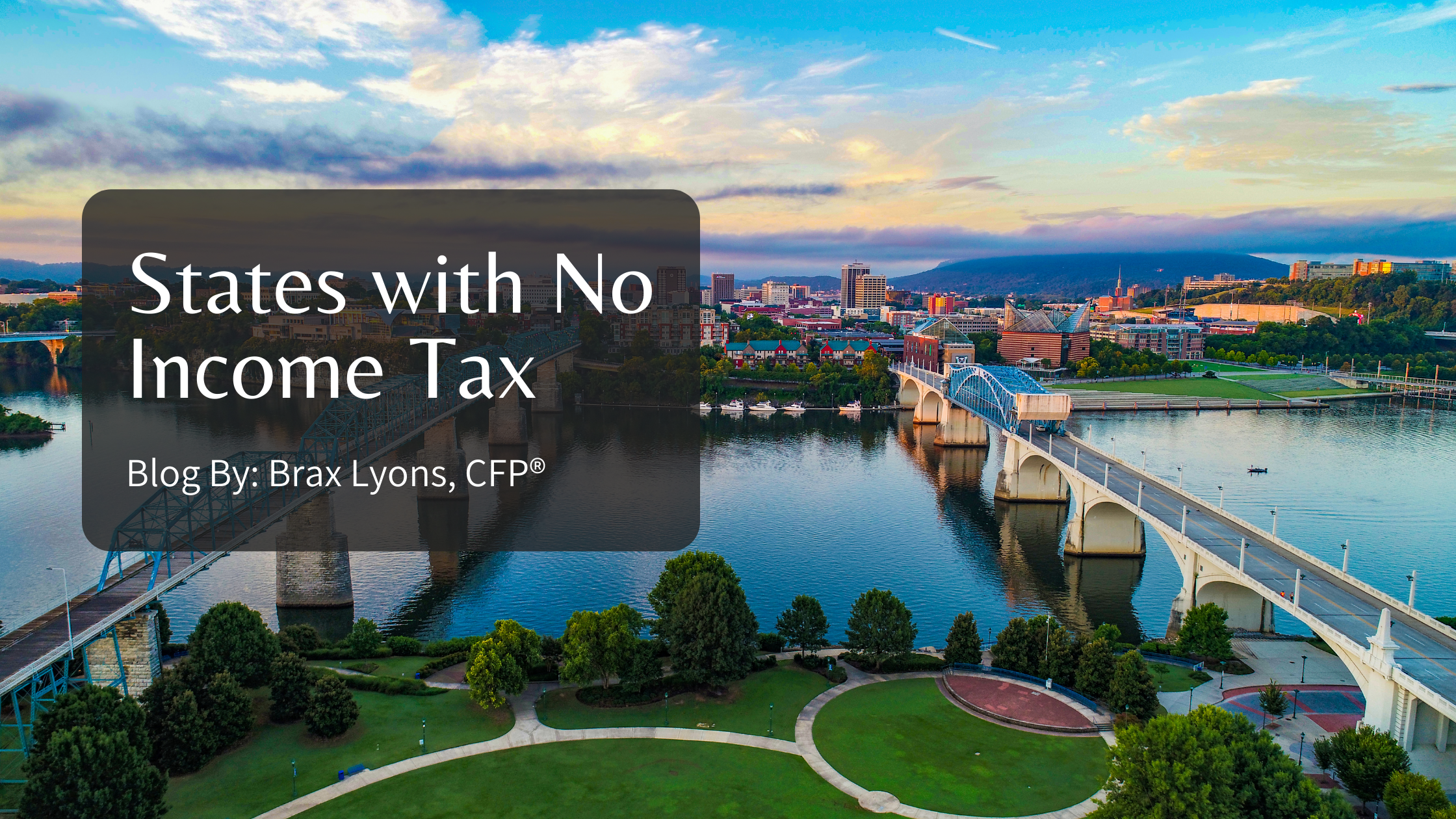States with No Income Tax

Everybody wants a lower tax bill. One way to accomplish this could be to live in a state with no income tax. However, before putting in for that job transfer or searching for your new home on Zillow, just know that living in a state without income tax isn’t necessarily any easier or any cheaper. Here are some key implications to think through before you consider any big moves.
Following the adoption of the U.S. Constitution, the federal government was granted the authority to impose taxes on its citizens. Each state also retained the right to impose what kind of tax it wanted, excluding any that are forbidden by the U.S. Constitution as well as its own state constitution. States that do impose an income tax do so to fund their governments through tax collections, fees, and licenses.
Which states don’t have income tax?
If you want to live in a state without income taxes, there are nine states to choose from: Alaska, Florida, Nevada, South Dakota, Tennessee, Texas, Washington, and Wyoming. Although New Hampshire doesn’t tax earned income, it is phasing out taxation of investment and interest income starting in 2023.
States with no income tax often make up the lost revenue with other taxes or reduced state services. The typical alternatives for raising revenues are state imposed sales and property taxes. Florida, for example, levies a 6 percent sales tax, and the average locality adds another 1.08 percent for a total of 7.08 percent. Tennessee, at 9.55 percent, has the highest combined sales tax of any state in the U.S. Washington state levies a tax of 49.4 cents per gallon on gasoline, one of the highest in the nation.
Income Tax vs No Income Tax
The table below illustrates the differences among states with no income tax. The first two columns show the state’s overall tax burden (state income taxes + sales/excise taxes + property taxes) as a percentage of personal income.
| No-Tax State | Tax Burden (% of Income) |
| Alaska | 5.16% |
| Tennessee | 6.18% |
| Wyoming | 6.47% |
| Florida | 6.82% |
| New Hampshire | 6.85% |
| South Dakota | 7.86% |
| Texas | 8.20% |
| Washington | 8.32% |
| Nevada | 8.39% |
Sources: WalletHub 2020 Tax Burden by State, 2018 U.S.
But before you pull up stakes and hire that moving company, let’s break this down even further state by state.
States Without Income Tax
Alaska
Alaska has no state income or sales tax. The total state and local tax burden on Alaskans, including income, property, sales, and excise taxes, is just 5.16% of personal income, the lowest of all 50 states. A large portion of Alaska’s tax revenues come from their sovereign wealth fund the Alaska Permanent Fund.
Alaska also levies the second-highest beer tax of any state in the union at $1.07 per gallon, bested only by Tennessee. Outside of tax considerations, there is the fact that Anchorage – one of the largest and most southern cities in the state – has only about five hours of sunlight during the winter months.
Florida
This popular snowbird state features the sun and warm temperatures Alaska lacks. Therefore, it also attracts a large population of retirees. Sales and property taxes in Florida are above the national average, but the overall tax burden is just 6.82%—the fifth-lowest in the country. Visitors are not treated quite so well, taxes on hotels and amusement park attractions are 6% on top of the 6% sales tax.
Nevada
Nevada relies heavily on revenue from high sales taxes on everything from groceries to clothes, sin taxes on alcohol and gambling, and taxes on casinos and hotels. This results in an overall state-imposed tax burden of 8.39% of personal income for Nevadans. It is the highest-ranking overall tax burden of all the states without an income tax.
South Dakota
Like many no-income-tax states, South Dakota counts on revenue from taxes on cigarettes and alcohol. The state has higher-than-average property tax rates but lower sales tax rates than many other states. It also features a tax-friendly climate for retirees. South Dakota’s unique position as home to several major companies in the credit card industry, in addition to higher property tax rates, helps to keep residents income-tax-free. South Dakotans pay just 7.86% of their personal income in taxes.
Texas
The Lone Star State loathes personal income taxes so much it decided to forbid them in the state’s constitution. But because infrastructure and services must be paid for somehow, Texas relies on income from sales and excise taxes to foot the bill. In some jurisdictions, sales tax can be as high as 8.25%. Property taxes are also higher than in most states, the net result of which is an overall tax burden of 8.20% of personal income.
Washington
Washington residents pay high sales and excise taxes, and gasoline is more expensive in Washington than in most other states. In addition, Washington state imposes an inheritance tax of 10% to 20% on estates over $2.2 million. The state has an overall tax burden of 8.32%.
Wyoming
Citizens pay no personal or corporate state income taxes, no retirement income taxes, and enjoy low property and sales tax rates. The overall tax burden—including property, income, sales, and excise taxes as a percentage of personal income—is 6.47%.
Tennessee
Before 2016, Tennessee taxed income from investments, including most interest and dividends, but not wages. Legislation passed in 2016 included a plan to lower taxes on unearned income by 1% per year until the tax was eliminated at the start of 2021. To make up for the shortfall, Tennessee levies high sales taxes and the highest beer tax of any state in the union at $1.29 per gallon. The state’s total tax burden is 6.18%, the third-lowest in the nation.
New Hampshire
This State does not tax earned income but does tax dividends and interest. New Hampshire’s Senate passed legislation to phase out the investment income tax by 1% per year over five years, with full implementation by 2027. The state has no state sales tax but does levy excise taxes, including taxes on alcohol, and its average property tax rate of 2.20% is the third-highest in the country. Even so, New Hampshire’s state and local tax burden is just 6.85%, ranking the state sixth in the nation.
Other Advantages
Another advantage of living in a no-tax state is that the $10,000 cap on state and local tax (SALT) deductions imposed by the Tax Cuts and Jobs Act will likely not have as great an impact as it does on residents of high-tax states, such as California, Minnesota, and New York.
Three other states have tax-friendly policies toward retirees. Illinois, Mississippi, and Pennsylvania don’t tax distributions from 401(k) plans, IRAs, or pensions. Alabama and Hawaii also don’t tax pensions, but they do tax distributions from 401(k) plans and IRAs.
The Bottom Line
Despite the challenges no-tax states face, some of them seem to find a balance between low taxes, affordability, and providing a great place to live. Others struggle. One thing is clear: Low taxes alone do not provide a complete picture of the cost of living for any state listed here. If you want to lower your tax bill, consider all the lifestyle factors that will impact your tax liability even in a state that foregoes taxed incomes.
Brad Lyons, CFP®
Investment Manager
Share This Story, Choose Your Platform!
Wiser Wealth Management, Inc (“Wiser Wealth”) is a registered investment adviser with the U.S. Securities and Exchange Commission (SEC). As a registered investment adviser, Wiser Wealth and its employees are subject to various rules, filings, and requirements. You can visit the SEC’s website here to obtain further information on our firm or investment adviser’s registration.
Wiser Wealth’s website provides general information regarding our business along with access to additional investment related information, various financial calculators, and external / third party links. Material presented on this website is believed to be from reliable sources and is meant for informational purposes only. Wiser Wealth does not endorse or accept responsibility for the content of any third-party website and is not affiliated with any third-party website or social media page. Wiser Wealth does not expressly or implicitly adopt or endorse any of the expressions, opinions or content posted by third party websites or on social media pages. While Wiser Wealth uses reasonable efforts to obtain information from sources it believes to be reliable, we make no representation that the information or opinions contained in our publications are accurate, reliable, or complete.
To the extent that you utilize any financial calculators or links in our website, you acknowledge and understand that the information provided to you should not be construed as personal investment advice from Wiser Wealth or any of its investment professionals. Advice provided by Wiser Wealth is given only within the context of our contractual agreement with the client. Wiser Wealth does not offer legal, accounting or tax advice. Consult your own attorney, accountant, and other professionals for these services.





